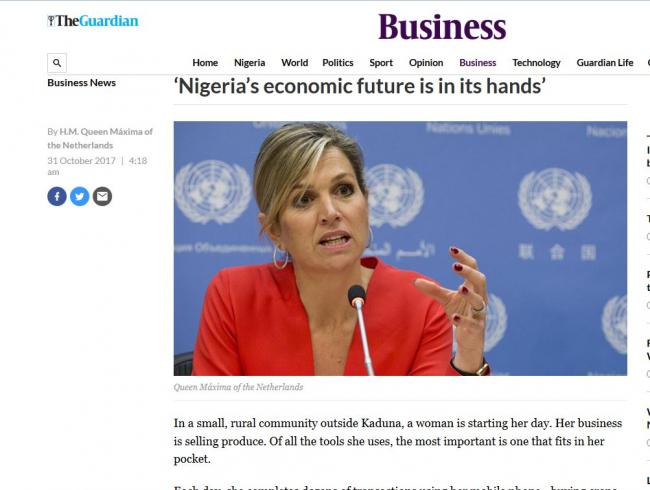
By H.M. Queen Máxima of the Netherlands, United Nations Secretary-General’s Special Advocate for Inclusive Finance for Development (This column was published on the first day of the UNSGSA's country visit to Nigeria, 31 October 2017, in three Nigerian papers: The Guardian, the Nation, and the Daily Trust.)
In a small, rural community outside Kaduna, a woman is starting her day. Her business is selling produce. Of all the tools she uses, the most important is one that fits in her pocket.
Each day, she completes dozens of transactions using her mobile phone—buying crops from growers, selling to her customers, paying school fees and other family bills. Using her mobile phone remotely to access low-cost and secure mobile money services, she has been able to stabilize her finances, save for the future, expand her business, and invest in her family’s welfare.
Mobile money isn’t a futurist fantasy, requiring new technologies that are generations away. If a phone can send and receive text messages, it can send and receive money. Eight out of 10 Nigerian adults already own a mobile phone with that capability. But only two out of 100 have a mobile money account—a lost opportunity to extend financial access to millions of Nigerians who are currently excluded from the financial system.
When I last visited here five years ago in my role as the UN Secretary-General’s Special Advocate for Inclusive Finance for Development, Nigeria was launching a detailed strategy to expand financial inclusion, especially to poor and rural communities. The ultimate goal was to strengthen equitable growth and development. Today, advances have been made but half the country still does not have even a basic financial account, and so leaders are refining those plans to encourage significantly faster progress.
Mobile money is one of the most promising and exciting tools available to transform the landscape of opportunity in Nigeria and around the world. A recent study from the Massachusetts Institute of Technology found that access to mobile money in one African country lifted ten percent of the extreme poor out of poverty—a truly inspiring result!
So what could mobile money mean in the daily lives of Nigerians?
- A peanut farmer in northern Nigeria could pay for his supplies in minutes using his mobile phone rather than traveling for hours to do so in person.
- Remember our produce seller
- outside Kaduna? Thanks to mobile money, she can limit the risk of carrying cash or hiding it at home by depositing it electronically into her account.
- A mechanic in Abuja could receive the credit he needs to improve his operation based on the digital history of his mobile money payments.
- A family in Sokoto state that has never had electricity at home could purchase a few hours of light each evening using a solar system that they pay for and activate through mobile money.
- A couple could afford to get medical help for an elderly parent in Kwara State thanks to low-cost health insurance they obtain through their mobile money provider.
When more and more people experience benefits like these, opportunity rises, poverty erodes, and the wealth of the nation grows and grows. So how can we move quickly to speed progress on financial inclusion and build mobile money into a viable option?
As the Secretary-General’s Special Advocate, I’ve traveled the world talking with governments, businesses, and individuals about financial inclusion—what works and what doesn’t. I’ve found rising recognition that mobile money can make an important contribution to financial inclusion and that it can be provided effectively by a range of entities, not just banks.
Mobile network operators, for example, have deep knowledge of digital technology and a great network of access points for low income populations. Nigeria is estimated to have between 150,000 and 200,000 airtime agents throughout the country. India, Pakistan, Tanzania, and Ghana all offer compelling examples of how this can work.
Other challenges will also need to be addressed. Anyone who has had their phone service drop out during a call can predict that problems with downtime could seriously undermine the growth of mobile money; connectivity will need to be strengthened. It will also be vital to build digital literacy among customers. And regulations must be put in place to protect them from fraud.
But mobile money invites us to think creatively in all sorts of ways. Phones can be wallets. Small shops can be mini-bank branches. Mobile money payment histories can be used to build a track record to gain credit. As your government sets the stage for these innovative ideas, we look to Nigeria’s banks and other businesses to bring them to life.
There is a lot of work to do, but this is a country that knows how to succeed. I look forward to the next chapter of that success—one that includes all Nigerians.
